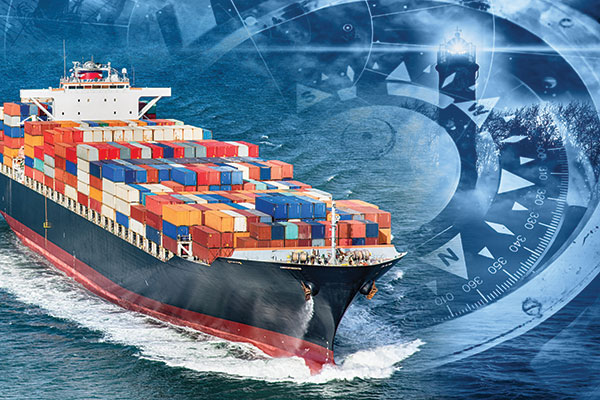Maersk and Hapag-Lloyd herald future plans for the ‘Gemini Cooperation’
Hapag-Lloyd said that the objective of this new offering will be to deliver a flexible and interconnected ocean network with industry-leading reliability. And Maersk explained that the Gemini Cooperation will provide unprecedented reliability, speed-to-market, and geographical reach, as well as continuing to support decarbonization and the company’s future intention to be a net-zero company.
Taking steps to deliver what they called a new long-term operational collaboration, global ocean container line service providers Copenhagen, Denmark-based A.P. Moller-Maersk and Hamburg, Germany-based Hapag-Lloyd said today they are partnering up for a new ocean network, entitled the “Gemini Cooperation,” which will take effect in February 2025
Hapag-Lloyd said that the objective of this new offering will be to deliver a flexible and interconnected ocean network with industry-leading reliability. And Maersk explained that the Gemini Cooperation will provide unprecedented reliability, speed-to-market, and geographical reach, as well as continuing to support decarbonization and the company’s future intention to be a net-zero company.
Upon the establishment of the Gemini Cooperation in February 2025, Hapag-Lloyd will exit THE Alliance, which also includes Ocean Network Express, Yang Ming and HMM, at the end of January 2025, and Maersk and MSC will conclude their 2M alliance at the same time, which they announced a year ago.
Maersk said that the 2M Alliance is still a highly reliable network for the East West trades and that MSC remains a valuable partner.
“We look forward to continued collaboration with MSC between now and the end of the 2M agreement in January 2025, followed by a smooth transition to the new Gemini network,” it said.
In separate customer advisories, the companies outlined the benefits of the Gemini Cooperation.
Hapag-Lloyd said that together the carriers will have a fleet pool made up of around 290 vessels and a combined capacity of 3.4 million TEU (Twenty-Foot Equivalent Units), with Maersk and Hapag-Lloyd deploying 60% and 40% of capacity, respectively. The company added that upon th Gemini Cooperation being “fully phased in,” Hapag-Lloyd and Maersk are setting their sights on schedule reliability of 90% or higher, with shippers seeing benefits from improved transit times in various port-to-port corridors, coupled with access to some of the most connected global ocean hubs.
Maersk said that the Gemini Cooperation will provide various benefits, including:
- covering seven trades: Asia/U.S. West Coast, Asia/U.S. East Coast, Asia/Middle East, Asia/Mediterranean, Asia/North Europe, Middle East–India/Europe and Transatlantic;
comprising 26 mainline services, with the mainline ocean services complemented by a global network of dedicated shuttles centered around owned and/or controlled transshipment hubs, with 14 shuttle services in Europe, 4 in the Middle East, 13 in Asia and 1 in the Gulf of Mexico, noting that these shuttle services will offer a fast connection with flexible capacity between hubs and ports served by shuttle services, and vice versa; and - seamless connections to a wide range of transportation products and logistical services; and
- competitive transit times across strategic corridors
From a sustainability perspective, through this collaboration, the companies respectively have what Hapag-Lloyd called the most ambitious decarbonization targets in the ocean shipping sector, with Maersk anticipating being net-zero in 2040 and Hapag-Lloyd in 2045.
“Teaming up with Maersk will help us to further boost the quality we deliver to our customers,” said Rolf Habben Jansen, CEO of Hapag-Lloyd. “Additionally, we will benefit from efficiency gains in our operations and joint efforts to further accelerate the decarbonization of our industry.”
Philip Damas, director and head of the supply chain advisors practice at London-based Drewry, told LM that Drewry understands that talks between Maersk and Hapag-Lloyd started fairly soon after 2M divorce was announced and that they quickly found they were “like-minded” with complementary assets (both ships and terminals) and commitment to decarbonization.
“The carriers say that there is a contractual commitment to quality—aiming for 90% reliability—which is new and something positive for the industry, if quality does improve,” he said. “Services will include fewer ports by design with concentration on controlled hubs.”
And he added that this development represents something of a contradiction to what Maersk told Drewry last year about needing to be independent to enable its integrator strategy, noting that Drewry was told the plan was always for a combination of independence plus cooperation.
What’s more, Damas explained that it is not known how the remaining carriers in THE Alliance will fill the gap left by Hapag’s departure.
“On their own, the remaining THE alliance carriers would be the smallest alliance and may not offer a wide enough or frequent enough network,” he said.













